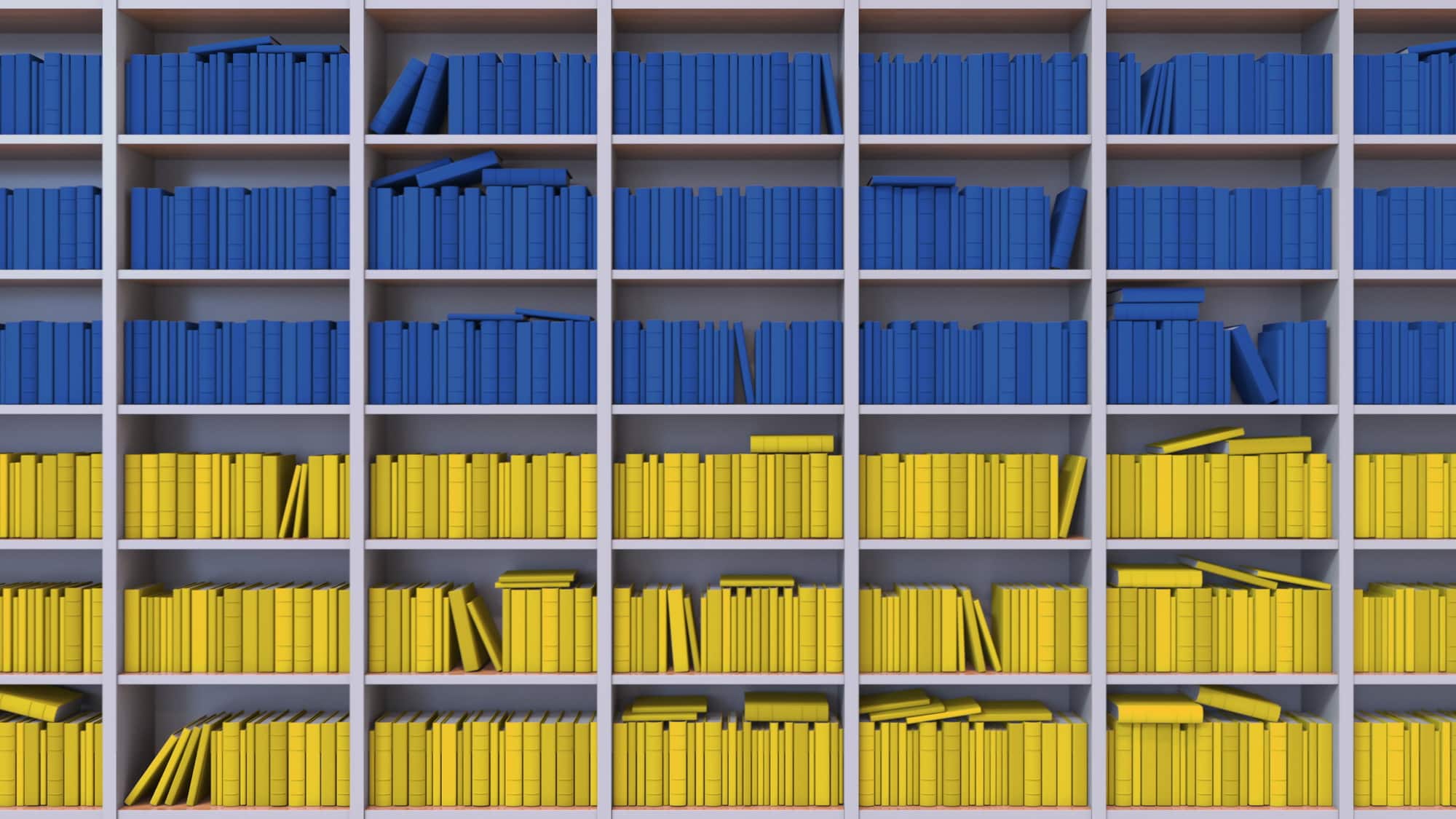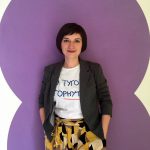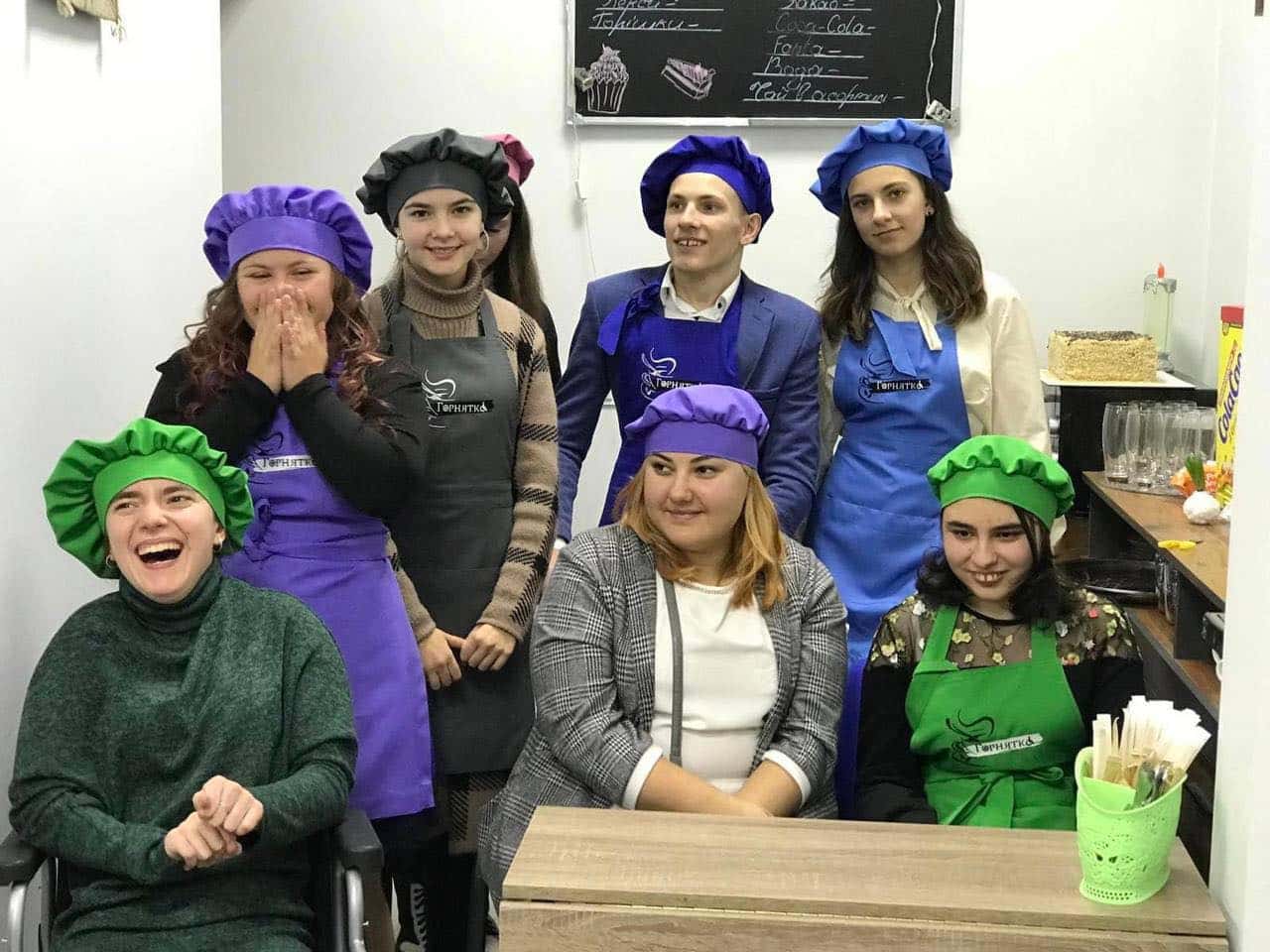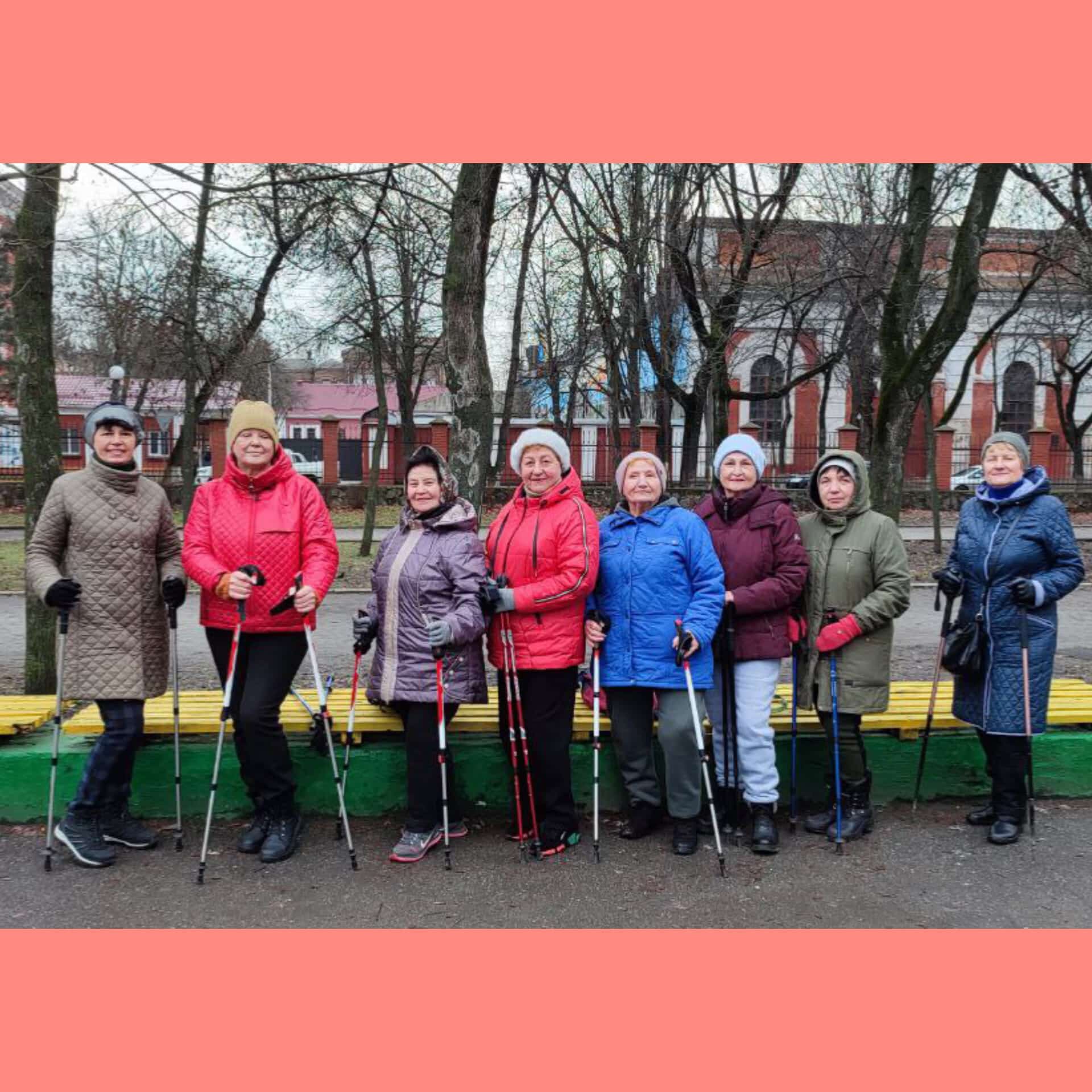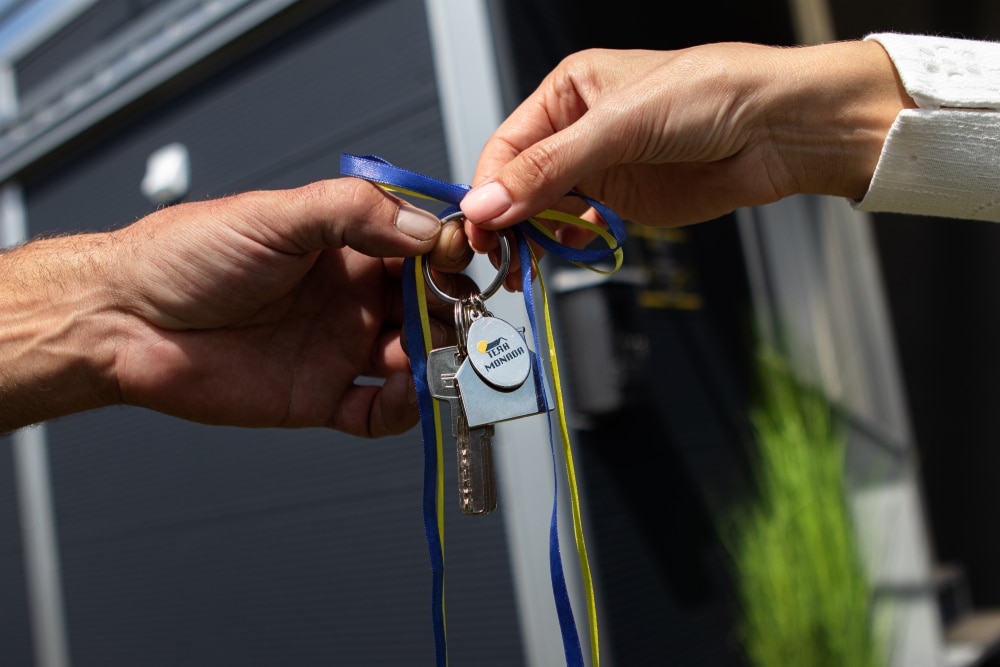Since the beginning of a new stage of war our educational system has undergone major changes. Over 1500 educational institutions have been destroyed in Ukraine, among them schools, vocational schools, colleges and universities. A great many students have been forced to leave their homes and educational facilities to continue their studies abroad.
Four students and postgraduate students from Kharkiv, Kyiv and Sumy, who have wound up in different Ukrainian cities as well as in Germany and Switzerland following the Russian full-scale invasion, share their stories about how their studies have changed and whether they are planning to return to Ukraine after victory.
‚As soon as we are told that it is safe to come back to Kharkiv, I will be the first to hit the road‘.
Ilona comes from the town of Bakhmut located in the Donetsk oblast. She has been studying at the department of journalism at the Karazin Kharkiv National University for two years now. Having moved to the second largest city of Ukraine, the young girl blended in with the active public life of the city. ‚Before the all-out invasion we used to weave camouflage nets, hold rallies at courthouses calling for decommunization, visit the front line and send lots of aid to Donbas‘, says Ilona.
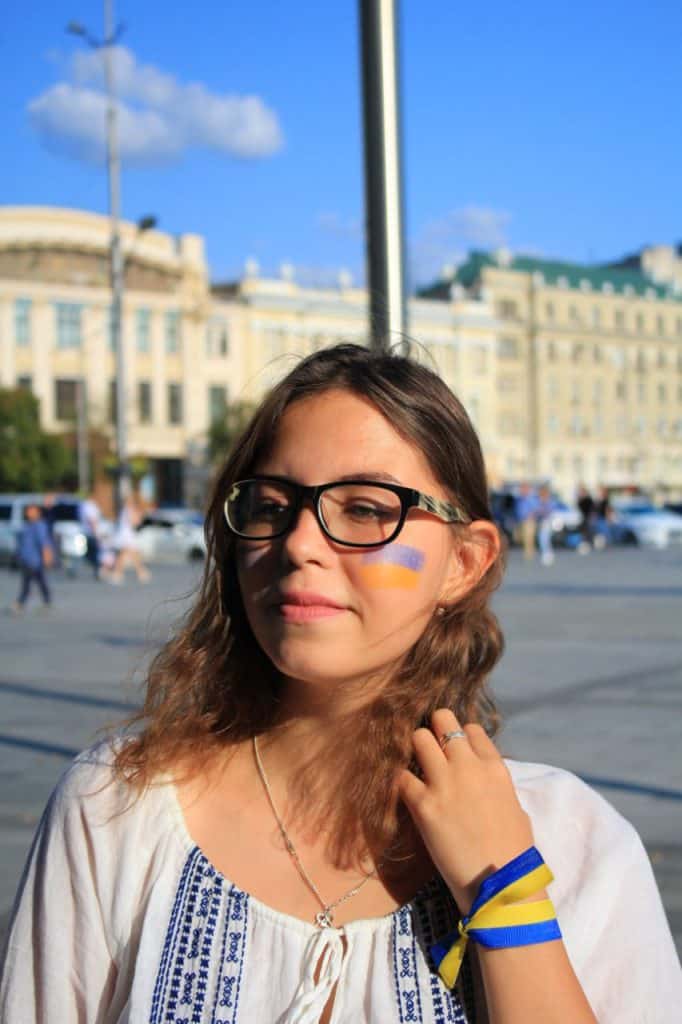
On February 24 she was in her native town in the Donetsk oblast. Ilona remembers waking up at seven in the morning and her mother saying that war had broken out. ‚On that day I was supposed to go to Kharkiv where I had built my bug-out bag on February 16. Luckily I had an ID and other documents as well as a laptop with me. I wanted to go back to Kharkiv really bad. I ran to the railway station to get information about the next train. To no avail. At that time Kharkiv was thronged with people with public transport not operating. I came to realize that all of my friends living there would abandon the city’, says Ilona.
She arrived in Chernivtsi shortly after her boyfriend’s family. It took her 30 hours to get there. ‚While I was on my way to Chernivtsi, I heard the sound of shots fired nearby. On one side there was the town of Izyum, on the other side the DPR (Donetsk People’s Republic, a breakaway state located in Ukraine – translator’s note). It was too dangerous to stay there. I departed from the railway station in the city of Kramatorsk. After a month it was struck by a tragedy… My nearest and dearest took the last bus to evacuate from the town’, says Ilona.
Since the lectures at university are being held in a simplified format (students sending their homework to professors), Ilona has temporarily enrolled at the Fedkovych Chernivtsi National University. ‚Things have gotten really asynchronous at the Kharkiv University, whereas here I have the opportunity to practice and learn new stuff, since each university has its own curriculum’, says Ilona.
To the girl’s mind, lots of students are happy with studying remotely. ‚You are free to do homework whenever you have time for it. Professors have given up setting deadlines. However, studying at two universities does have significant bearing on me. Also, I have to take exams’, says Ilona. She has stopped keeping in touch with her classmates. Many of them have emigrated, some have stayed at their homes. One of Ilona’s classmates is now in Mariupol.
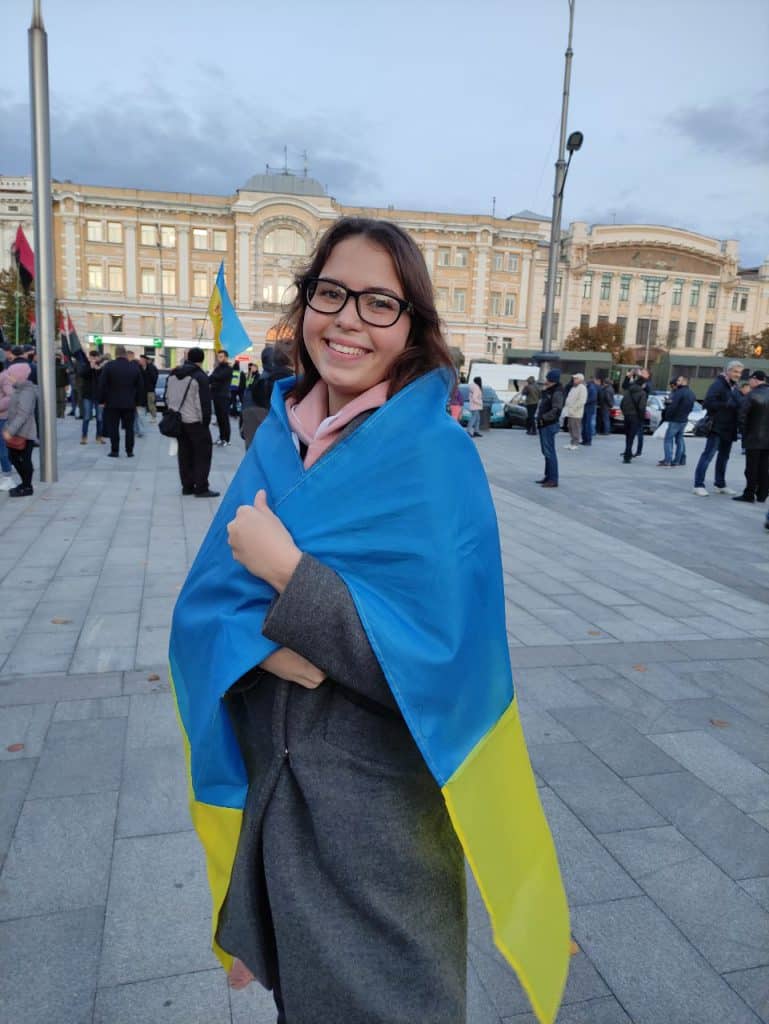
Aside from studying, Ilona works at a laundry offering free services to refugees that was set up at the end of April in Chernivtsi.
Aside from studying, Ilona works at a laundry offering free services to refugees that was set up at the end of April in Chernivtsi. She really enjoys working there. ‚You can load the washing machine and then put the laundry into the dryer and do your homework in between‘, says Ilona. Apart from that, the girl is active in doing volunteer work. As soon as the opportunity to help presents itself, she seizes it.
Ilona is sure that the level of education in Ukraine has dropped since quarantine limitations were imposed. Studying from home makes one relaxed. ‚With journalists, for example, it is much easier since we don’t need to venture outside in order to write an article. If you are a doctor or a teacher, the situation is not that straightforward’, says Ilona.
She admits to having always wanted to live in Kharkiv. ‚As soon as we are told that it is safe to come back to Kharkiv, I will be the first to head to the post office to send my stuff and hit the road back home‘, she adds.
‚The fact that i am currently residing in Germany does not mean a thing. All my thoughts are now in Ukraine‘.
Natalya is in her second year of postgraduate ecology studies at the Sumy National Agricultural University. Before the war she had been organizing cultural events in Ukraine (Cherkasy Book Festival, Sumy Rock Fest, Ukrainian festival ‚More.Fest‘). In October 2021 she had received a scholarship from the German Federal Foundation for the Environment (Deutsche Bundesstiftung Umwelt), having gone to the town of Kassel located in northern Hesse, Germany. On February 23 the scholarship had been extended for another 2 months. On the following day a new stage of war broke out. In view of the situation representatives of the foundation took a decision to allocate additional funds to support scholars in their research at respective German universities during the whole of 2022.
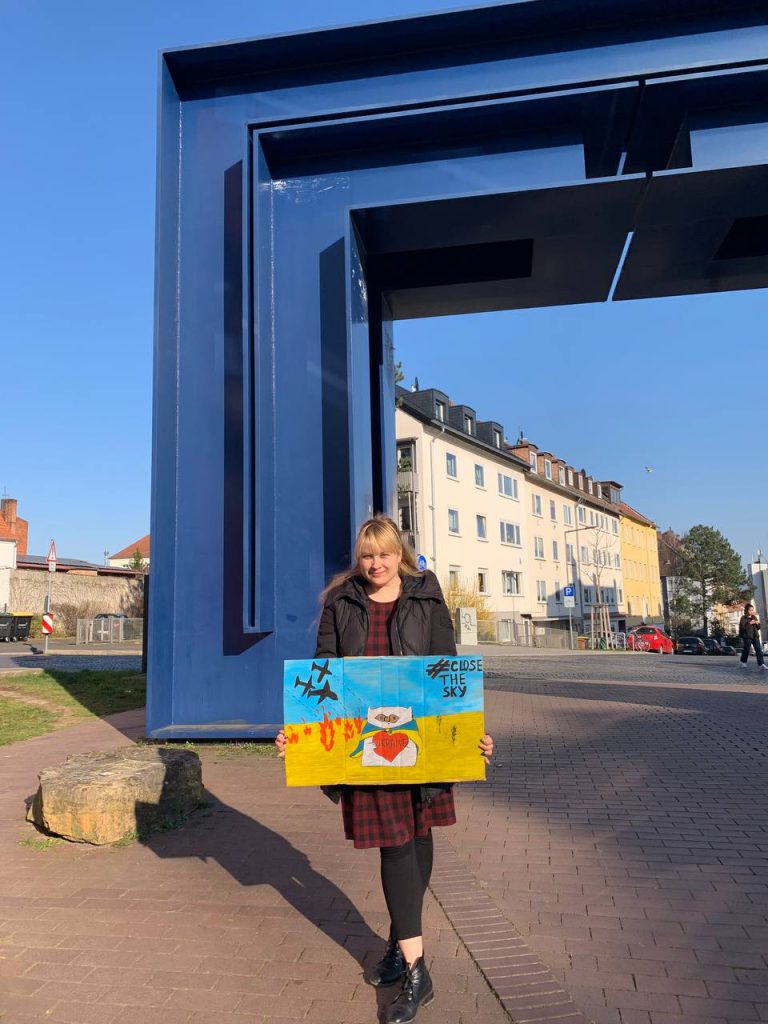
‚I was hesitating. I did not know whether I was supposed to keep studying as I was missing my nearest and dearest friends a lot. However, the Sumy oblast had found itself under Russian occupation right at the beginning of the invasion, so there was no possibility to go back home’, says Natalya.
She discussed with her parents possible developments in the war since they lived in one of the oblasts bordering Russia. They fully understood that the occupation was not long in coming, so Natalya decided against going home.
‚On February 24 my mom saw that I was online’, says Natalya, ‚and sent me four words: Hi! We’ve been attacked‘.
Natalya has had recollections of war since 2015 when she was frequently visiting the front line. ‚The first question that sprang to mind was whether I can help my country. I had to raise money to buy tactical first aid kits until they were gone from the market,’ says Natalya. On February 25 the department for landscape architecture of the Kassel University, where Natalia is studying, raised the needed sum.
‚Kassel is a small town, even smaller than Sumy. Before February 24 I had been alone in my bubble engrossed in science and in my project. My circle of contacts limited themselves to the department and a few people related to it. Being alone while your native country found itself in the state of war was not the best idea’, says Natalya. It is for this reason that Natalya came into contact with her Ukrainian friends living abroad. They organized themselves to start providing help.
‚There is no forest in Sumy any longer. The object of my scientific research has been destroyed so there is no place for me in Ukraine to carry on with my dissertation. At the same time the German university has repeatedly offered me to keep working in Germany. All those things we have been doing in Sumy for 40 years are not being done here even now’, says Natalya.
Natalya occasionally visits Ukraine to deliver humanitarian and medical help. She admits that Germans sometimes ask her whether she is sure that the massacre in Bucha has not been staged.
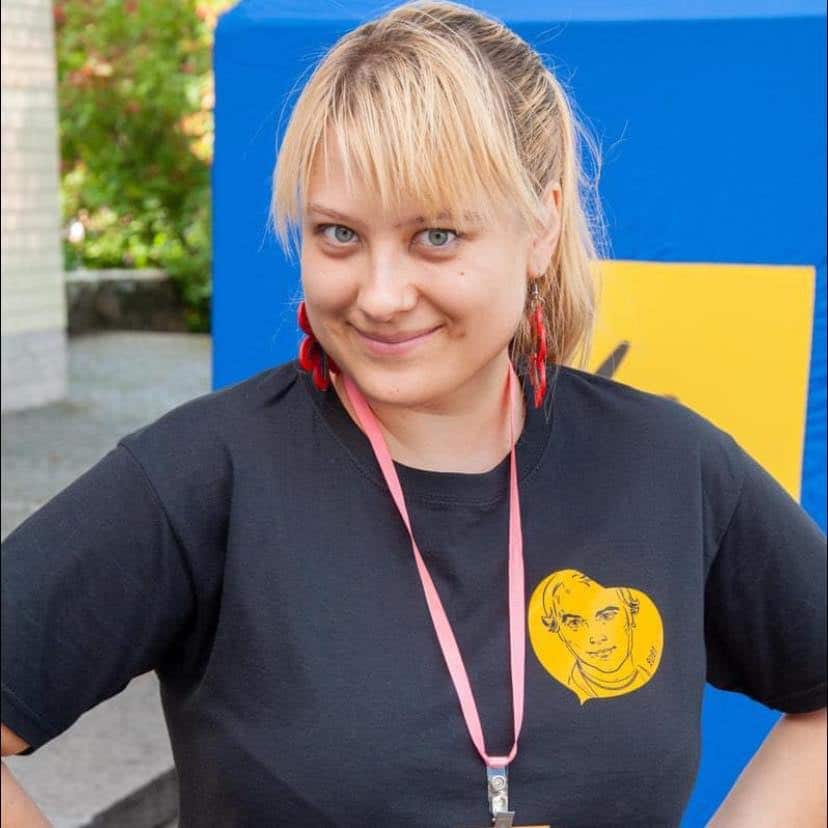
Whenever she hears this Natalya invites them to visit the town with her. ‚The only country where I can live is Ukraine. I like to introduce our culture to the world. I want as many people as possible to learn about what we do and about the scientific school in Sumy. I want them to know just how educated Ukrainians are’, says Natalya.
After the victory she’s planning to help rebuild Eastern Ukraine, in particular the city of Kharkiv where her brother lives. Natalya has a dream of going on tour with local rock musicians through villages and towns of the Sumy oblast. ‚All my thoughts are in Ukraine. The fact that I am currently residing in Germany does not mean a thing’, Natalya sums it up.
‚I close my eyes and I see pictures of the Lukyanivka district in Kyiv where I used to live in a dormitory’.
19-year-old Vladyslav is a distant-learning student at the department for International law (the faculty of management) of the Institute of International Relations of the Taras Shevchenko National University. He refused to believe until the very last moment that war would come, although his mom had asked him to come and visit his native town of Chernivtsi. She had had a premonition that something might happen. However, Vladislav chose to stay in Kyiv. The week before the full-scale invasion he visited a friend of his in Lviv to wait out a few days. He then took himself to Chernivtsi. He did not want to stay there for a long time, though. ‚And then on the morning of February 24 my mom woke me up and said that the war had started. I was overwhelmed by the news and didn’t understand what was going on. At first I thought that it was some kind of a Russian provocation, since they are prone to such tricks’.
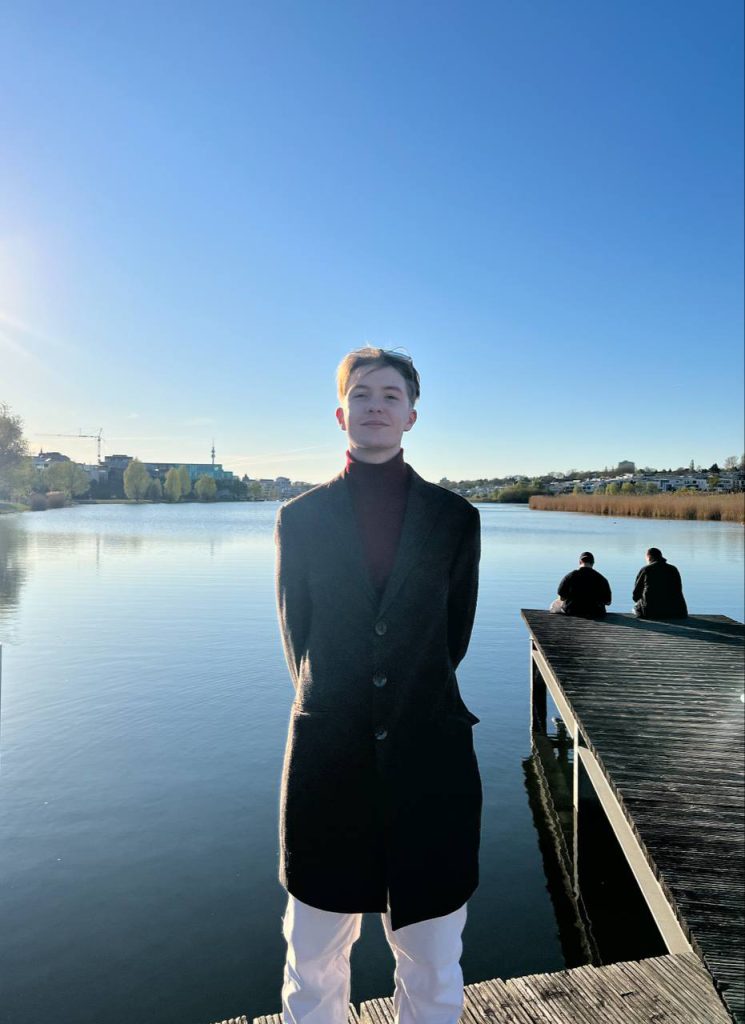
Immediately after the invasion he and his mom jumped into their car and headed off towards the border. ‚At eight in the morning there already were lots of cars. Some of them were moving in the opposite direction, which confused me. We thought that maybe they were not allowed to cross the border. Having arrived at the Hungarian border, we were kept waiting for a very long time. The Hungarian border guards were reluctant to let Ukrainians in. As far as I can tell, Hungary is not supporting us that much’, says Vladislav.
In the framework of an exchange program he is now studying at the University of Tübingen in Germany. ‚As of now the studying process has not got off the ground yet. However, we have been welcomed here. Many of our students have come here. Germans are very friendly. They support and help us. Once a total stranger spent 100 euros on buying food for me’.
Vladyslav has applied to many universities in Switzerland, Great Britain, the USA etc. ‚Each country sets its own requirements. Priority is given to those students whose universities had previously signed an agreement of cooperation. I am one of these students. However, this is not necessarily always the case. Many universities admit students without any particular reasons’, says Vladyslav. He also says that some universities require the applicants to pass a language test. This can be done either at the university or on a website. ‚A great many universities are ready to admit students and accommodate them in the dormitory. Germany is very helpful in this regard. You’re not supposed to speak German for the first six months. They provide you with the opportunity to take a German language course and help you learn it. If you want to move on, you will be required to learn the language’, says the young Ukrainian. It is Vladyslav’s firm conviction that it is possible to enroll at the university as long as you maintain constant contact with universities and seek for opportunities.
More about scholarships for Ukrainians at German universities read here.
Vladyslav remembers participating in the face-to-face learning process. It was quite hard. The COVID-19 pandemic brought major changes about, which made universities adjust to online teaching. ‚This implies consequences with the quality of education dropping since it all depends now on how responsible the students are. At the same time it is worth mentioning that the level of education at Ukrainian universities (provided one really wants to study) is quite high. By no means are we inferior to students from other countries. War may lead to students beginning to study at foreign universities, which may cause problems for them once they to Ukraine’, says Vladyslav.
When the war broke out Vladyslav was quick to help several acquaintances of his to move to the Western parts of Ukraine. Two families are currently residing in his apartment, one being from Kyiv and the other from Kharkiv. He has also helped people come to Germany. He’s now ready to counsel refugees on finding an apartment and on other issues. This particularly goes for students since Vladyslav has been through a similar turmoil himself and he is ready to share his experience. ‚As soon as my mom and I moved to Germany, I immediately set out to help send cargos to Ukraine and organize transfers to Lviv, Rivne and Chernivtsi‘, says Vladyslav. Right now he is planning to search for volunteer organizations in Tübingen in order to help other people. Life in Germany is well-ordered, pleasant and quiet. ‚This will never be a substitute for home. In Kyiv I used to live in a dormitory located in the Lukyanivka district. After some time I saw photos of this place after it had been hit by a bomb. I have several times cried myself to sleep looking at these pictures. We will stay here for some time but will have to return home in order to help our country get back to normal’.
‚You hope every single time that none of the people whom you love will be on the list of those killed’
Bohdana is from Odesa. She is in her third year of studying at the Institute of International Relations of the Taras Shevchenko National University. Bohdana is also learning Spanish. She has volunteered for the ‚Crimean Platform‘ (a diplomatic initiative of Ukraine and its president to restore Russia-Ukraine relations by means of reversing the 2014 annexation of Crimea by Russia – translator’s note). The young Ukrainian has been dreaming of going abroad to study with Erasmus+, so she had been applying for various scholarships. However, she has never been granted one.
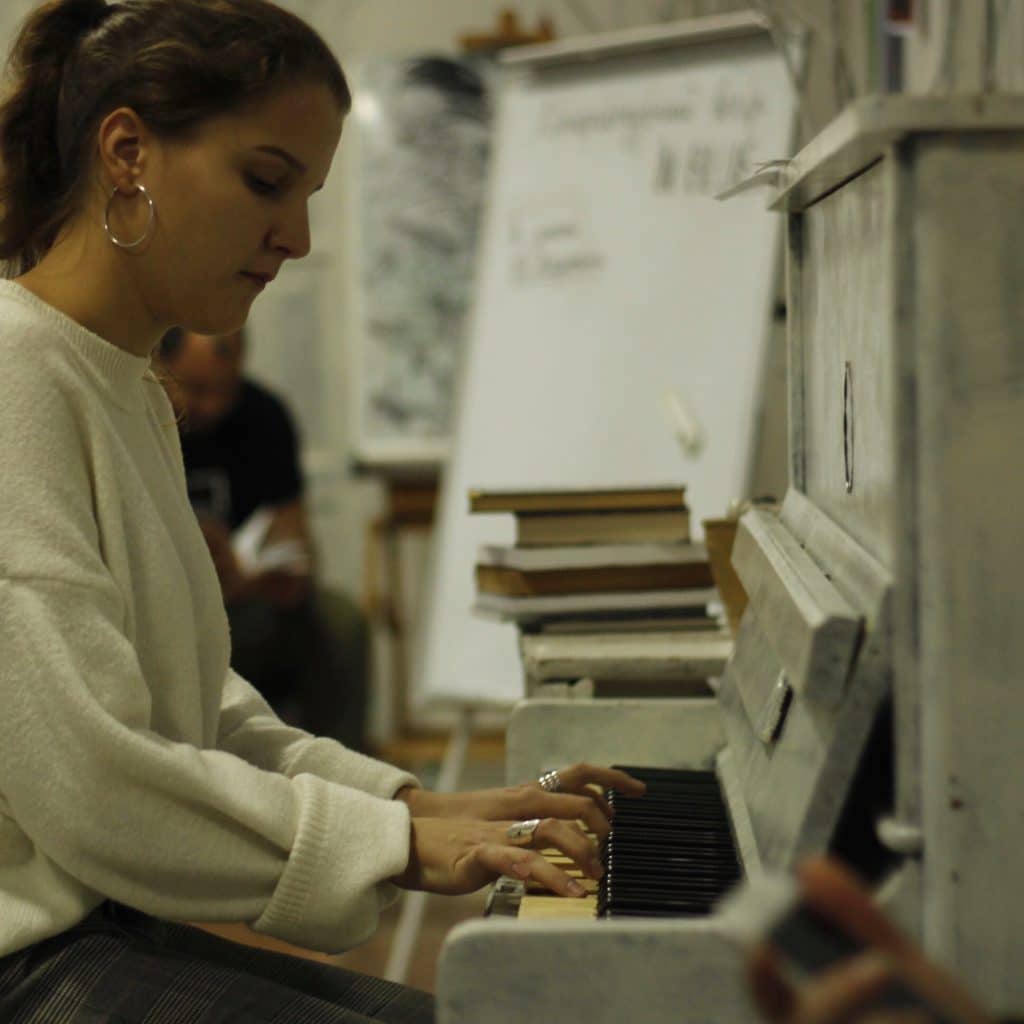
On the eve of the full-scale invasion by Russia Bohdana had gone to visit her grandmother in the city of Kryvyi Rih. ‚Emotionally the first several weeks were a nightmare. There was much talk of an imminent war. However, I did not believe this would be the case. On February 24 I was to have listened to a lecture at eight in the morning. At 6 am my grandmother entered my room and said that war had broken out. I thought she was kidding and I went back to sleep’. After the war started Bohdana spent some time in a village. The studying process was suspended. Riding a bike and spending time in nature offered her some solace.
The girl remembers the day when a television tower in Kyiv (situated near her institute and dormitory) was hit by a missile.
‚I know that some of my friends have stayed there. I also know that they could have simply gone out to buy some food and ended up among those who were killed. Every time when reading news I realize that something may happen, but I also hope that none of the people whom I love will be on the list of those killed’, says Bohdana.
There was no point in going to Kyiv or Odesa so the girl stayed in Kryvyi Rih together with her grandmother and their dog. She was deprived of maintaining any social contacts or engaging in other activities. It was at that time that Bohdana remembered her dream of studying abroad, so she started seeking for opportunities. While browsing on the Internet she came across the Zürich University in Switzerland, which she applied to. She immediately received the invitation. The only thing she needed to have was the confirmation of her being a Ukrainian student.
In Kyiv Bohdana studied international relations. In Zürich she’s studying at the Institute of Political Science. ‚When we came here we were offered several options. We could either frequent lectures without earning credits or taking as many credits as we wanted. The language of instruction is German but we are also offered courses taught in English. You don’t have this choice in Ukraine’, says Bohdana. She says that the atmosphere at the university is quite mellow and that she’s trying to engage in communication with others during university classes. ‚It is easier to study here. We are required to read two 40-page articles for each seminar. In Ukraine you are asked a question and you are given a million sources to search for an answer. It is more difficult to study in Ukraine. Here you are given concrete tasks’, she says.
The girl never ceases to amaze at the support offered by the Swiss. ‚The university has offered us free training, has found families that can host us. They provide me with food and I don’t have to pay for anything. One day my PowerBank broke down and the people with whom I live presented me with a new one’, says Bohdana. Apart from this, Ukrainian students also receive the support from the so-called ‚buddies‘, i.e. their Swiss peers who help them with everything. Bohdana has 2 buddies. Some other Ukrainians may have even 4 of them. ‚Those Ukrainian students who need help are greatly outnumbered by their Swiss peers willing to help‘, says Bohdana, amazed.
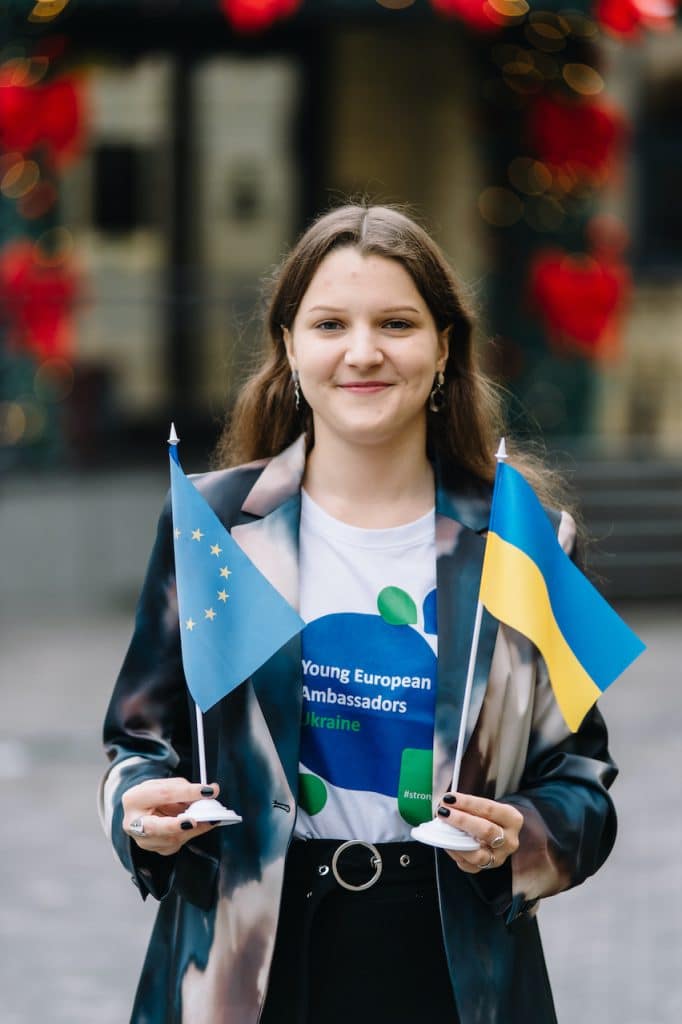
She did not stay in Ukraine because she realized that things were going to be tough in terms of education. ‚The educational process at our university has resumed, which many students are not happy about. Someone has left the country with others having stayed in Kyiv. Some of my friends have either enlisted in the territorial defense units or signed up for volunteer work. I am happy about the resumption of the educational process. Professors are trying to work and motivate students’, says Bohdana. She continues to learn Spanish at her alma mater. Bohdana says that the nature of university classes has changed with professors having become more permissive. ‚Everyone understands one another and the atmosphere is very warm. After all these challenges like the pandemic and war we will revise our system of education. Its future will be definitely better. It’s not about what sort of specialists we’re going to be, but rather about how we are going to work while rebuilding our country based on the knowledge we will have acquired’, adds Bohdana.
After all these challenges like the pandemic and war we will revise our system of education. Its future will be definitely better.
Bohdana and her friends are going to organize local fundraising events at the Zürich University. For example, an exhibition featuring pictures of what is going on in Ukraine and other pieces of art is going to be held. ‚We want to show just how beautiful our country is with a view to attracting the attention of Swiss people’, says Bohdana.
All the money will be donated to cover financial needs of Ukrainian orphans who have been evacuated from the hotspots and who have taken shelter in Western Ukraine.
The Ukrainian is planning to stay in Switzerland for another semester. ‚The thing is that in order to stay here I have to take courses taught in German, the language I don’t speak at all. To master this language at the level of a graduate student is a pretty tall order’, says Bohdana. Besides, she likes Spanish and she would like to acquire necessary qualifications to become an interpreter. Bohdana admits that she would like to return to Ukraine and get a diploma so as to find her place and work in her native country.

